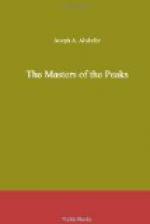Now, in very truth, Robert did notice the fierce triumphant shout of Tandakora, over and above the yelling of the horde, and it made him shudder again and again. It was the cry of the man-hunting wolf, enlarged many times, and instinct with exultation and ferocity. That terrible cry, rising at regular intervals, dominated the battle in Robert’s mind, and he looked eagerly for the colossal form of the chief that he might send his bullet through it, but in vain; the voice was there though his eyes saw nothing at which to aim.
Farther and farther back went the rangers, and the youth’s heart was filled with anger and grief. Had they endured so much, had they escaped so many dangers, merely to take part in such a disaster? Unconsciously he began to shout in an effort to encourage those with him, and although he did not know it, it was a reply to the war cries of Tandakora. The smoke and the odors of the burned gunpowder filled his nostrils and throat, and heated his brain. Now and then he would stop his own shouting and listen for the reply of Tandakora. Always it came, the ferocious note of the Ojibway swelling and rising above the warwhoop of the other Indians.
“Dagaeoga looks for Tandakora,” said the Onondaga.
“Truly, yes,” replied Robert. “Just now it’s my greatest wish in life to find him with a bullet. I hear his voice almost continuously, but I can’t see him! I think the smoke hides him.”
“No, Dagaeoga, it is not the smoke, it is Areskoui. I know it, because the Sun God has whispered it in my ear. You will hear the voice of Tandakora all through the battle, but you will not see him once.”
“Why should your Areskoui protect a man like Tandakora, who deserves death, if anyone ever did?”
“He protects him, today merely, not always. It is understood that I shall meet Tandakora in the final reckoning. I told him so, when I was his captive, and he struck me in the face. It was no will of mine that made me say the words, but it was Areskoui directing me to utter them. So, I know, O, my comrade, that Tandakora cannot fall to your rifle now. His time is not today, but it will come as surely as the sun sets behind the peaks.”
Tayoga spoke with such intense earnestness that Robert looked at him, and his face, seen through the battle smoke, had all the rapt expression of a prophet’s. The white youth felt, for the moment at least, with all the depth of conviction, the words of the red youth would come true. Then the tremendous voice of Tandakora boomed above the firing and yelling, but, as before, his body remained invisible. Tandakora’s Indians, many of whom had come with him from the far shores of the Great Lakes, showed all the cunning and courage that made them so redoubtable in forest warfare. Armed with good French muskets and rifles they crept forward among the thickets, and poured in an unceasing fire. Encouraged by the success at Oswego, and by the knowledge that the great St. Luc, the best of all the French leaders, was commanding the whole force, their ferocity rose to the highest pitch and it was fed also by the hope that they would destroy all the hated and dreaded rangers whom they now held in a trap.




